It is one of the episodes that generates more controversy in recent history.
On March 20, 2003, a coalition led by the United States together with allied countries such as the United Kingdom and Spain, began the invasion of Iraq.
LOOK: 20 years after the war in Iraq, what happened to the key figures in the conflict?
The objective? Finish with saddam hussein -who ruled Iraq for almost 25 years- and his alleged weapons of mass destruction.
What would have been a three-week lightning war lasted for 7 years and left brutal consequences: more than 100,000 civilians killed, according to the organization Iraq Body Count (IBC), and a country plunged into chaos.
What led George W. Bush and some allies to invade this country (despite not having the backing of the United Nations or traditional allies like Germany or France)? And what consequences does it still have to this day? Here we tell you.
Why did the invasion happen?
To understand what happened on March 20, 2003, you have to go back a bit in history.
Despite the fact that at the beginning of his government, Saddam Hussein maintained a good relationship with the United States -because he was seen as a natural ally to curb the influence of the Iranian Islamic revolution-, his ties with the West were broken definitively in 1990, when he decided to encroach Kuwait.
The Iraqi occupation set off alarm bells in the West. The United Nations (UN) even gave him a deadline to withdraw from the Arab country but Hussein refused.
Given this, an international coalition authorized by the UN and made up of 34 countries -among them, the United States- intervened and ended up expelling the Iraqi troops from Kuwait, in what became known as the first Gulf War.
Saddam Hussein’s image deteriorated more and more in Western eyes. were imposed on him harsh economic sanctions that led Iraq to a deep financial crisis and left its population destitute, with high rates of malnutrition and lack of medical supplies.
The country was also subjected to a series of UN inspections to monitor the alleged destruction of chemical weapons. But Hussein did not cooperate.
A decade later, the attacks of September 11, 2001 occurred in New York, after which the President of the United States, George W. Bush, placed Iraq among the countries of the “Axis of evil” (a list that also included North Korea and Iran) because he allegedly supported terrorism.
It was not more than two years after that episode when Washington and its allies decided to overthrow Hussein’s regime.
Weapons of Mass Destruction: The Key Evidence That Never Existed
“Saddam Hussein and his sons must leave Iraq within the next 48 hours. His refusal to do so will result in a military conflict beginning at a time of our choosing.”
The words, pronounced by Bush on March 17, 2003, were the initial kick to the strong offensive that only three days later would begin in Iraq.
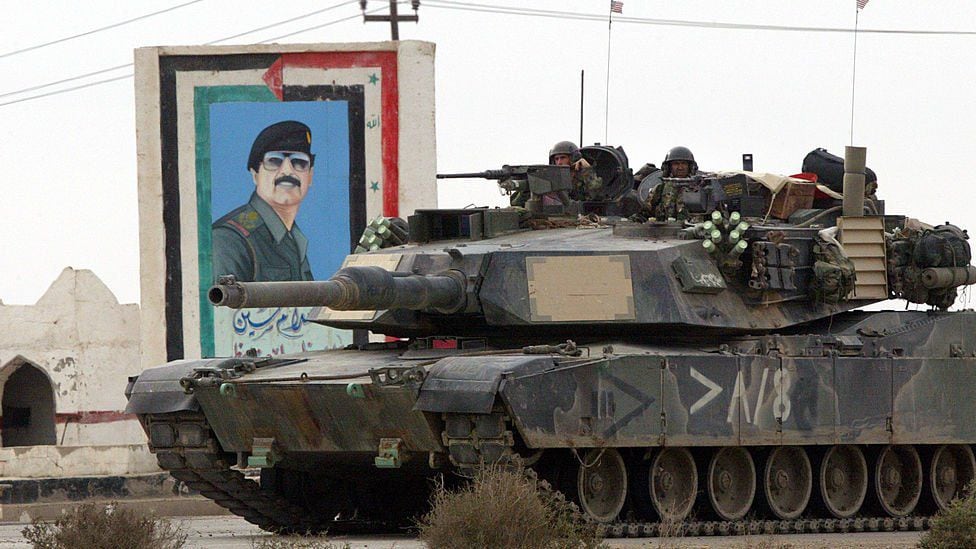
But what was the justification for attacking?
Different reasons have been put forward -among them, Hussein’s alleged support for terrorist organizations such as al Qaeda-, but there is one that is key: the existence of an alleged arsenal of weapons of mass destruction (chemical, biological and nuclear) in Iraq.
This arsenal, however, was never found.
Years later it was learned that the data used to confirm this theory were based on lies and inventionswhich was one of the biggest military intelligence failures in history.
In their defense, the rulers of that time have pointed out that their own informants assured them that the weapons existed.
“It’s really important to understand that the intelligence he was receiving is what he trusted, and I think he had a right to trust it,” the former British prime minister told the BBC. Tony Blair.
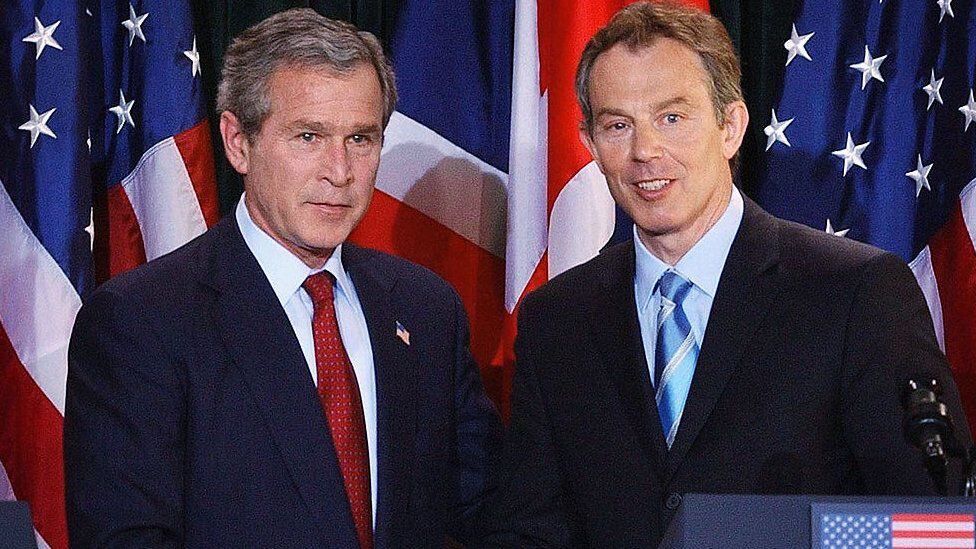
In this, the lies of some Iraqi spies played a central role.
One of them was Rafid Ahmed Alwan al-Janabian Iraqi defector who came to Germany in 1999 to a refugee camp seeking political asylum and saying he was a chemical engineer.
At that time, he claimed to have worked in a plant that manufactured mobile biological weapons as part of an alleged Iraqi weapons of mass destruction program.
Alwan al-Janabiera was known by the name of curve ball (which in English means a baseball pitch that takes a curve and fools batters).
Despite the fact that the British, American and German intelligence services questioned the authenticity of his claims, Washington and London ultimately decided to believe him.
The United States Secretary of State, Colin Powell, told the UN in 2003 that Iraq had “mobile laboratories” to produce biological weapons. While the then Prime Minister of the United Kingdom, Tony Blair, he said that “beyond any doubt” Saddam Hussein was continuing to produce this arsenal.
Still, there was no irrefutable proof.
But according to BBC News security correspondent Gordon Corera, for the United States “the issue of weapons of mass destruction (WMD) was secondary to a deeper objective: to overthrow the Iraqi leader.”
“We would have invaded Iraq if Saddam Hussein had had a rubber band and a paper clip”Luis Rueda, head of the CIA’s Iraq Operations Group, told Corera.
“We would have said, ‘Oh, he’s going to gouge out your eye,'” he added.
Alwan al-Janabi later admitted lying in order to get Hussein overthrown, but the US and its allies had already begun the invasion.
Hans Blix, who led the UN’s chemical and biological inspections, told the BBC that until early 2003 he believed there were weapons, but began to doubt their existence after the claims could not be confirmed.
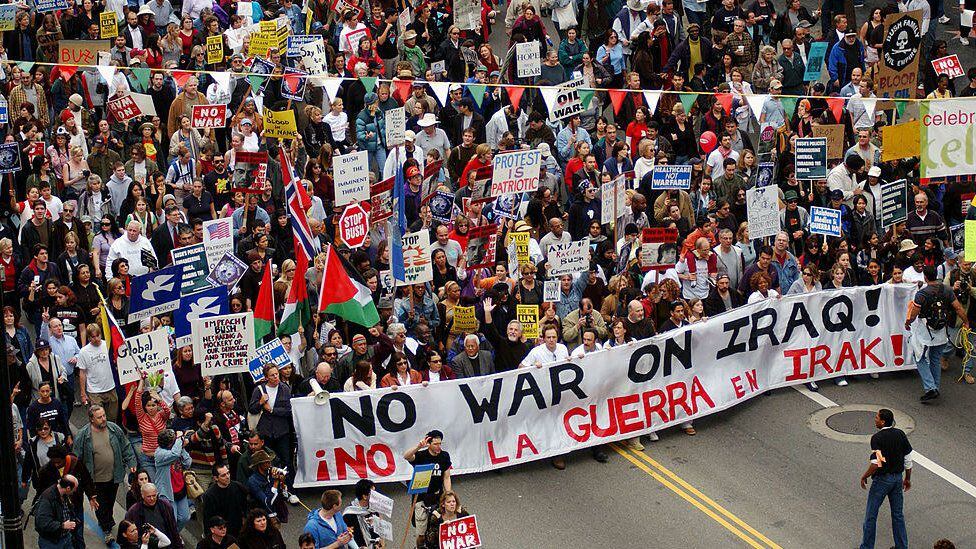
It’s worth remembering that Saddam Hussein did once have weapons of mass destruction that he used against the Iraqi Kurds in the late 1980s.
According to Gordon Corera, the Iraqi leader ordered the destruction of much of his arsenal in the early 1990s, after the first Gulf War, and amid UN inspections.
However, he would have destroyed everything in secret, partly to keep up the pretense that he still had something to use against his neighboring country, Iran.
So when UN inspectors later asked Iraq to prove it had destroyed everything, it couldn’t.
consequences of war
The controversial military operation did not take long to end the regime of Saddam Hussein, who was captured in December 2003 and executed 3 years later.
Little by little, however, the hope of the Iraqis with the arrival of the Americans began to fade.
“After the invasion, the impression in cities like Baghdad or Basra was that the occupying forces were concentrating more on militarily controlling the country, capturing Saddam Hussein and suppressing any source of resistance, than on providing aid and services to the local population,” recalls Matías Zibell, sent by BBC Mundo to the war in Iraq.
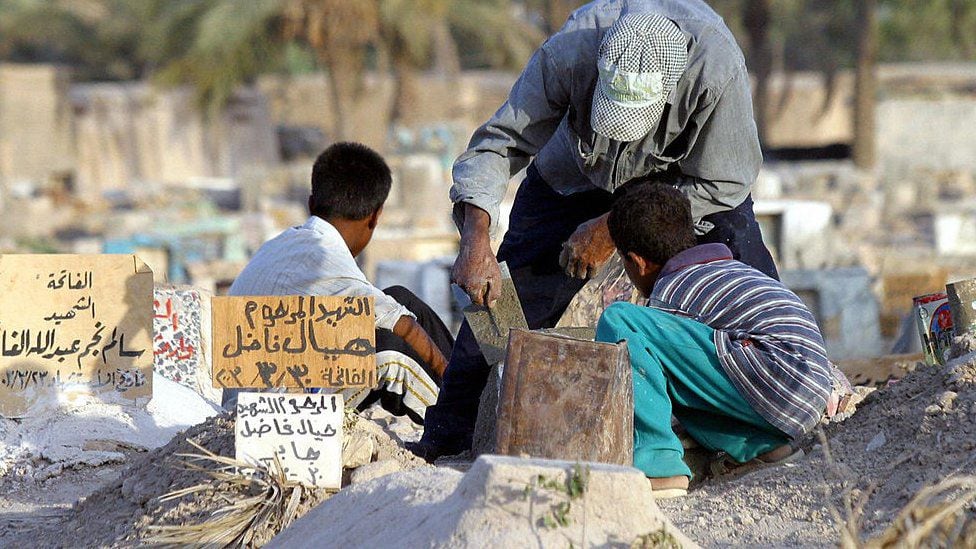
In this way, the power vacuum after the fall of Hussein generated chaos among the local population. Public buildings, museums and hospitals were raided and looted.
Months later, bloody sectarian violence broke out. Especially by the majority Shiites over the Sunnis, who had been the most privileged under Saddam’s regime.
“There was poor post-war planning on how they wanted the country to move forward. There was no clear vision of whether to hold elections, whether it was the Iraqis who should write the Constitution,” he explained to BBC Mundo Hamzeh Haddad, Iraqi political analyst.
“I think more effort should have been made to give them a role earlier, and just accept the fact that Iraq had gotten rid of Saddam, and now they had to choose who led the Iraqis,” he added.
The lack of planning for after the invasion has been cataloged as one of the great failures that continues to have repercussions today.
An “incubator” for extremists
One of the most controversial decisions the United States made was to demobilize the Iraqi army.
Thousands of people with military experience were left without jobs and many chose to go into the insurgency. Thus, subversive groups began to emerge, turning Iraq into a incubator of jihadist extremists.
He Islamic State of Iraq (ISIS) it emerged from that chaos, pledging allegiance to al Qaeda, and is still a factor of violence and uncertainty in the Middle East.
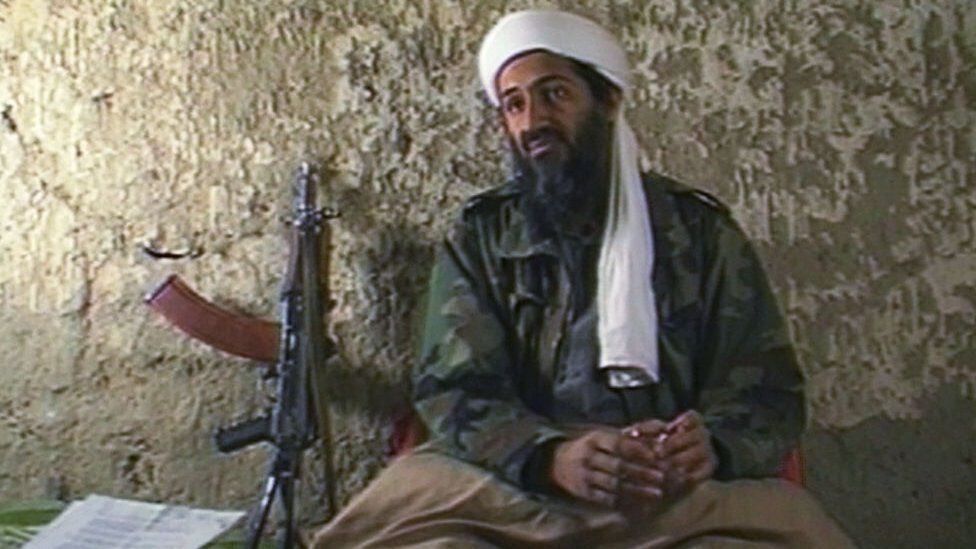
Rebel groups that attacked the US military also emerged in the Shiite area, such as the al-Mahdi Army, a militia led by the cleric Muqtada al-Sadr.
Only at the end of 2011 did US troops leave Iraq, when they considered that the fight against these rebel groups was under control.
But the insurgency of some of these extremist factions forced the United States to redeploy troops repeatedly.
In recent years, however, Iraq has regained some stability and with it part of its weight in the region.
“Especially after the defeat of IS in 2017, Iraq started to take on a bigger role at the regional level. It’s starting to play a mediator between Iran and Saudi Arabia. It’s starting to hold regional and international conferences in Baghdad, and I think that is very important,” says Hamzeh Hadad.
However, and despite the progress, two decades after the invasion, Iraq is suffering from a serious economic and political crisis and, above all, a social wound that still seems far from closed.
*With reporting by BBC News Mundo journalists Gonzalo Cañada and Fernanda Paúl, and Gordon Corera, BBC News security correspondent.
Source: Elcomercio
I am Jack Morton and I work in 24 News Recorder. I mostly cover world news and I have also authored 24 news recorder. I find this work highly interesting and it allows me to keep up with current events happening around the world.

:quality(75)/cloudfront-us-east-1.images.arcpublishing.com/elcomercio/GE4DANBNGAZS2MRQKQYDAORRHA.jpg)

:quality(75)/cloudfront-us-east-1.images.arcpublishing.com/elcomercio/BEZRTXP6VNEI3KVRVELPE5C4XM.jpg)
:quality(75)/cloudfront-us-east-1.images.arcpublishing.com/elcomercio/JQGFGBLPNVCZ5LUBTZXRGM44PU.jpg)
:quality(75)/cloudfront-us-east-1.images.arcpublishing.com/elcomercio/KRYCYI6CVBGVJARSNCALERXLZ4.jpg)
:quality(75)/cloudfront-us-east-1.images.arcpublishing.com/elcomercio/N7JTRN7FN5DNNMK73F5GCVFLD4.jpg)
